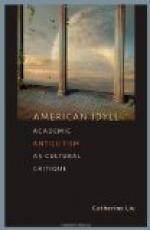And that brings me to my concept of a God. God exists in us because of our bundle of social brother-acts. Contemplation and crying out and assertions of belief are in the main notices that we are substituting something for acts. Our God should be a thing discovered only in retrospect. We live, we fight, we know others, and, as Overstreet says, our God sins and fights at our shoulder. He may be a mean God or a fine one. He is limited in his stature by our service.
I fear your God, because I think he is a product of the unreal and unhelpful, that he has a “bad psychological past,” that he is subtly egotistical, that he fills the vision and leaves no room for the simple and patient deeds of brotherhood, a heavenly contemplation taking the place of earthly deeds.
You feel that I quote too many minds and am hobbled by it. I delight just now in the companionship of men through their books. I am devoted to knowing the facts of the lives of other humans and the train of thought which their experiences have started. To lead them is like talking to them. I suspect, even dread, the “original thinker” who knows little of the experiments and failures of the thinkers of other places and times. To me such a stand denies that promising thing, the evolution of human thought. I also turn from those who borrow, but neglect to tell their sources. I want my “simple boys and girls of Washington” to know that to-day is a day of honest science; that events have antecedents; that “luck” does not exist; that the world will improve only through thoughtful social effort, and that lives are happy only in that effort. And with it all there will be time for beauty and verse and color and music—far be it from me to shut these out of my own life or the lives of others. But they are instruments, not attributes. I am very glad you wrote.
Sincerely yours,
Carleton H. Parker.
CHAPTER XIII
In May we sold our loved hill nest in Berkeley and started north, stopping for a three months’ vacation—our first real vacation since we had been married—at Castle Crags, where, almost ten years before, we had spent the first five days of our honeymoon, before going into Southern Oregon. There, in a log-cabin among the pines, we passed unbelievably cherished days—work a-plenty, play a-plenty, and the family together day in, day out. There was one little extra trip he got in with the two sons, for which I am so thankful. The three of them went off with their sleeping-bags and rods for two days, leaving “the girls” behind. Each son caught his first trout with a fly. They put the fish, cleaned, in a cool sheltered spot, because they had to be carried home for me to see; and lo! a little bear came down in the night and ate the fish, in addition to licking the fat all off the frying-pan.




